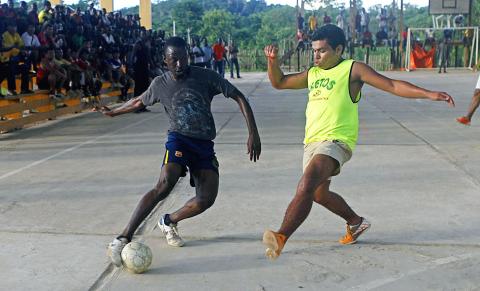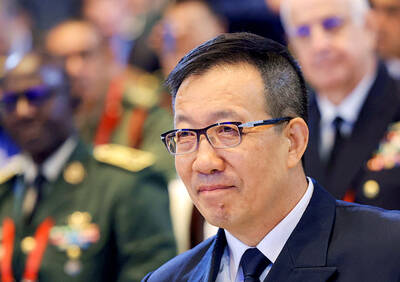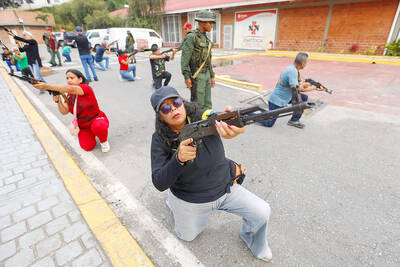Nearly 300 Haitians fleeing the poverty of their earthquake-ravaged homeland have been stuck for a month in the Peruvian Amazon, where a gate to what they saw as a better life in Brazil has abruptly closed.
Mostly educated and in their 20s, they have taken refuge in a stuffy church in the Peruvian border town of Inapari since Brazil stationed federal police along the border early last month to stop a wave of illegal immigration.
The 273 Haitians in Inapari sold all their belongings and paid big fees to unscrupulous travel agents to fly to Peru through Panama or Ecuador. They planned to cross overland into Brazil, where a growing economy has attracted about 4,500 desperate Haitians since the earthquake two years ago — only to find that the border was closed when they arrived.

Photo: Reuters
“We don’t have money and we are so far from Haiti ... we just ask Brazil to let us in,” said Joniel Clervil, 22, speaking in the English he learned in university before the January 2010 disaster ended his studies.
Having run out of cash, the group is relying on donations of rice and beans from the Brazilian border town of Assis Brasil. It is not clear if they will eventually be able to stay in Brazil or Peru, or be deported.
Brazilian President Dilma Rousseff, in an attempt to manage the influx and discourage “coyotes” who take advantage of the immigrants, said during a visit to Haiti on Feb. 1 that her country would award 100 humanitarian visas per month in Port-au-Prince in the next five years, while tightening border security.
Brazil also has said it would give humanitarian visas to all Haitians already in Brazil, but that future migrants would be turned back at the border unless they had obtained proper visas before leaving Haiti.
Peruvian President Ollanta Humala has tried to help shut down what the governments regards as a human trafficking route by signing a decree last month requiring Haitians to obtain a tourist visa before entering Peru.
The Haitians stuck in Peru left home before the changes took effect and they are now in bureaucratic limbo. The governments say they will hold a meeting next week where they could decide the Haitians’ fate.
Brazil has Latin America’s largest economy and it now faces a very “First World” problem as a place that draws immigrants looking for work. It is increasingly viewed as an alternative to the US, which has stepped up deportations of undocumented immigrants during the worst economic downturn since World War II.
Rene Salizar, a Peruvian priest, said Brazil’s clampdown was inevitable. He said there has been a constant stream of Haitians at the border since a magnitude 7.0 earthquake killed 300,000 people and left 1.5 million homeless in Haiti two years ago.
“I saw this coming more than a year ago. Groups of between five and 20 were arriving daily,” said Salizar, who has arranged for the Haitians to stay in the town’s church and his house.
Brazil’s ties to the poorest country in the Americas grew after it led a UN peacekeeping mission to Haiti as part of a broader push to assert itself as a global leader.
“Brazil has a commitment to help the Haitian people and their country ... this includes those Haitians who want to come work in Brazil — so long as it’s within a limit that can be absorbed by the labor market,” Brazilian Ambassador to Peru Carlos Alfredo Lazary Teixeira said.
Stories of ample jobs, especially in construction as Brazil gears up to host the 2014 World Cup and the 2016 Olympics, led the Haitians to fly-by-night travel agencies that promised them passage into Brazil for US$3,000.
There is a chance Brazil could allow the Haitians to apply for humanitarian visas at the Brazilian embassy in Lima, but most of the Haitians do not have the two soles (US$0.74) hotels in Inapari charge to use the bathroom. None of them have the bus fare.
“My mother sold everything she had to pay for this trip,” Esther Pierre, 26, said in her native Kreyol. “If I go back now, how am I going to help my family?”

BEIJING FORUM: ‘So-called freedom of navigation advocated by certain countries outside the region challenges the norms of international relations,’ the minister said Chinese Minister of National Defense Dong Jun (董軍) yesterday denounced “hegemonic logic and acts of bullying” during remarks at a Beijing forum that were full of thinly veiled references to the US. Organizers said that about 1,800 representatives from 100 countries, including political, military and academic leaders, were in Beijing for the Xiangshan Forum. The three-day event comes as China presents itself as a mediator of fraught global issues including the wars in Ukraine and Gaza. Addressing attendees at the opening ceremony, Dong warned of “new threats and challenges” now facing world peace. “While the themes of the times — peace and development —

Venezuela on Saturday organized a day of military training for civilians in response to the US deployment in the Caribbean, and amid new threats from US President Donald Trump. About a month ago, Washington deployed warships to international waters off Venezuela’s coast, backed by F-35 jets sent to Puerto Rico in what it calls an anti-drug and anti-terrorism operation. Venezuelan Minister of Defense Vladimir Padrino Lopez has accused Washington of waging “undeclared war” in the Caribbean, after US strikes killed over a dozen alleged drug traffickers off his country’s coast. Caracas also accused the US of seeking regime change, and

BRIBERY ALLEGATIONS: A prosecutor said they considered the risk of Hak-ja Han tampering with evidence to be very high, which led them to seek the warrant South Korean prosecutors yesterday requested an arrest warrant for the leader of the Unification Church, Hak-ja Han, on allegations of bribery linked to the country’s former first lady and incitement to destroy evidence. The move came a day after the 82-year-old was questioned over her alleged role in bribing former first lady Kim Keon-hee and a lawmaker. Founded in 1954 by her late husband, Sun Myung Moon, the Unification Church has long been the subject of controversy and criticism, with its teachings centered on Moon’s role as the “second coming” and its mass weddings. Followers are derisively referred to as “Moonies.” However, the church’s

‘MURDER’: The US has not provided proof that boats it has struck were trafficking drugs, and a Venezuelan official said it was a crime against humanity that must be investigated Venezuela on Friday accused the US of waging an “undeclared war” in the Caribbean and called for a UN probe of US strikes that have killed more than a dozen alleged drug traffickers on boats over the past few weeks. Washington has deployed warships to international waters off Venezuela’s coast, backed by F-35s sent to Puerto Rico in what it calls an anti-drug operation. “It is an undeclared war, and you can already see how people, whether or not they are drug traffickers, have been executed in the Caribbean Sea. Executed without the right to a defense,” Venezuelan Minister of Defense Vladimir